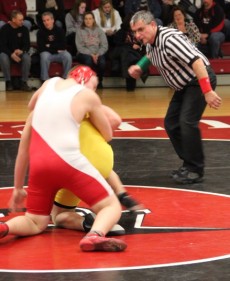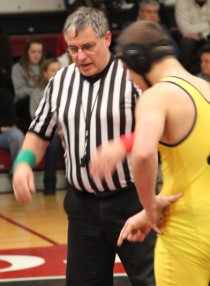In his late 50s, Earl Stoddard entered into a new phase of his life. Not all that out-of-the-ordinary in this day and age.
The way he stayed true to himself was to remain connected with the discipline he enjoys. Now he just pursues it in a more ‘official’ capacity.
No one in the history of the sport locally has had a greater influence on Lebanon County wrestling than Stoddard. But recently, he traded in his tie and clipboard for stripes and a whistle.
After 30 years of coaching wrestling, Stoddard has become an official.
“You really get a better understanding of the sport by being an official,” said Stoddard. “The way the calls are made. And why they are made. And why points are awarded. Indeed, it did make me look at it differently. The more background you have of a sport, the better knowledge you’re going to have of that sport.
“You certainly look at wrestling from a different perspective,” added Stoddard. “‘Why didn’t he make that call? Why didn’t he award those points?’ Positioning is so important with officiating. I look back on times when I might have been a little hard on officials.”
A PIAA-certified official since 2004, Stoddard became more active last season when he worked seven or eight, mostly JV and junior high matches. This year, Stoddard officiated 16 or 17 similar competitions, and depending upon the rating he receives at the end of the year, he could work some varsity matches next season.
So how would Coach Stoddard assess the progress that Earl Stoddard the official is making?
 “I would say he’s certainly making an attempt to be fair,” said Stoddard, 61. “Sometimes it’s difficult. You try to block out everything and do the best job you can. In 2004, I became an official to get a better understanding of the rules, and to better coach my kids to the rules.
“I would say he’s certainly making an attempt to be fair,” said Stoddard, 61. “Sometimes it’s difficult. You try to block out everything and do the best job you can. In 2004, I became an official to get a better understanding of the rules, and to better coach my kids to the rules.
“I don’t know how long I’m going to do it,” Stoddard added. “It’s a year at a time. It’s somewhat active. You’re moving around the mat. It’s a good form of exercise. We all need to stay active. And I like being around the sport.”
Sometimes when Stoddard officiates matches he runs into former colleagues, men he coached against and with.
“I’d have to say that overall those meetings have been pretty positive,” said Stoddard. “Hopefully that will continue. I’m going to miss calls. All officials do. You just try to get yourself in the right position, and hope to do the best you can.”
Stoddard was the head coach at Northern Lebanon High School from 1986 through 2007 and helped produce Lebanon County’s only state champion, Jim Collins. After stepping aside as the Vikings’ head man, Stoddard spent three season grooming future Vikings in Northern Lebanon’s junior high program.
In the early 1980s, Stoddard founded the Elco wrestling program.
“There are times you miss it,” said Stoddard. “I’ve done it so many years that it was time to move on and let someone else do it. I didn’t have the desire to go into the (practice) room any more.
 “I was actively involved with coaching for 30 years,” continued Stoddard. “And I didn’t want to get out of the sport. I see officiating as a method of giving back.”
“I was actively involved with coaching for 30 years,” continued Stoddard. “And I didn’t want to get out of the sport. I see officiating as a method of giving back.”
Stoddard is a member of the Pennsylvania Wrestling Coaches Hall of Fame. He is also a past president of the state Wrestling Coaches Association and the District Three Wrestling Coaches Association.
In addition, Stoddard was instrumental in the developing the Lancaster-Lebanon League Wrestling Tournament.
“I was fortunate to have some very good wrestlers,” said Stoddard. “There were a few wrestlers who didn’t get to states who maybe should have. But we were fortunate to have some great individuals who became fine young men.
“I liked the tournaments, when several wrestlers excelled,” added Stoddard. “I also liked the postseason. I love watching athletes, wrestlers progress.”
Stoddard has no grand plans like officiating at the PIAA Wrestling Championships. But then again, when he started out in the 1980s, he never expected to have the type of coaching career he enjoyed.
“Yes, there is an appreciation of the sport,” said Stoddard. “You’re looking at wrestling from a different perspective. When you’re out there you’re really listening for things like unsportsmanlike conduct.
“I don’t know where it’s going to go,” Stoddard added. “I just take it one year at a time. I’d like to get better. I’d like to give back to the sport. But I don’t have any aspirations as far as the state tournament or bigger tournaments. I just want to make the right calls.”
Sounds like he already has.